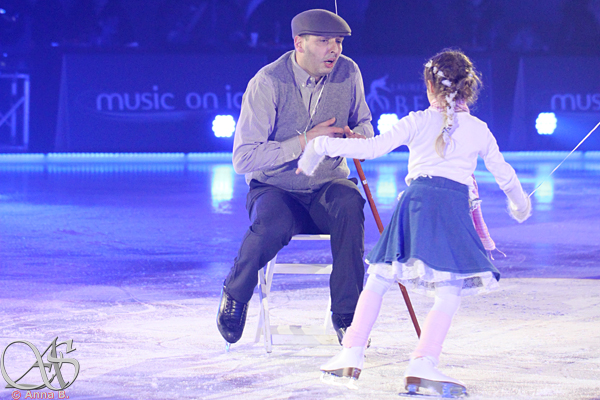Laurent  Tobel:  "After years of making people laugh, finally I made them cry!"
March 22, 2014
By Reut Golinsky, Anna Bertoloni
Photos © Anna Bertoloni
For the fourth year in a row, Laurent Tobel invited the Swiss audience to his "Music on Ice" show in Bellinzona. Each season he presents a new concept and this time it was "Paradiso," "the heaven." The cast was extended to include not only skaters, but also aerial gymnasts. After the premiere, we spoke about this and his vision for this show as a whole.
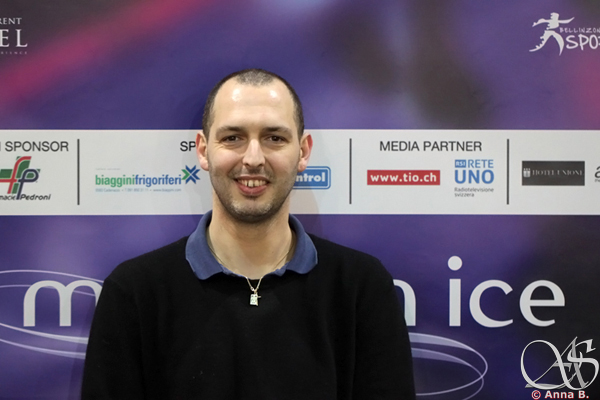
This year there were new elements in the show that we didn't see before, like aerial gymnasts. Where did this idea come from?
For this show, "Paradise," I wanted people to look not only down on skaters. In this ice rink 1800 people have to lower their head to see the show. I wanted to raise their glances to the air, [and the show] to symbolize heaven.
Usually, in galas skaters choose to alternate different kinds of music. Here almost all were of the same style, soft and quiet... Wasn't it a risk?
The risk was not that big, because everything is always calculated. We have so many comic interludes, small sketches that we do together, this speeds up the rhythm a lot, so it was ok. Actually for me, the most important thing about this show, above everything else, was the harmony of the music, from the beginning to the end. 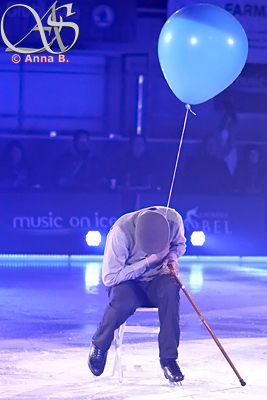 Obviously I do not want people to get bored, our goal is never to have people slouching in their seats. They must always anticipate something about to happen. I really think about the show as a whole, so I listen to the musical pieces and if all of them go well together, for me it works. It must be also a pleasing, harmonious experience.
Obviously I do not want people to get bored, our goal is never to have people slouching in their seats. They must always anticipate something about to happen. I really think about the show as a whole, so I listen to the musical pieces and if all of them go well together, for me it works. It must be also a pleasing, harmonious experience.
Do you choose all the musical pieces by yourself?
I choose every single exhibition piece and if the skater doesn't have what we need for the show, we can try to adapt the story or use a new piece to which he will skate for us.
Stéphane Lambiel mentioned that you already asked him to skate his "Run" program in the summer. Does it mean that half a year before the show, you already know what you want to use?
The point is that we want to have a complex show. Doing a skating show usually takes a few weeks, but to make it really complex, as we do, takes months. When I created my company, my goal was to create complex shows. It doesn't look complex for the audience, but there are several aspects that are not seen and because they are there, you really enjoy the show. With "Music on Ice," we have a three week break after the show and at the end of January we already start preparing for the next one, so it's 11 months of preparation.
I choose the skaters not so much for their titles - of course they are very important, we want to work with elite skaters - but we choose them for what they bring to the show, based on their capability of acting and becoming a part of it. Every time we choose the skaters, there is a very deep analysis of what they can bring and how we can use their qualities to their greatest potential.
We enjoy it! The preparation is great because I see maybe around fifteen different programs [of a skater] thinking: "How can I adapt this to the story?" It is interesting and as long as they are very good skaters, it's always very enjoyable to watch them on my computer!  (laughs)
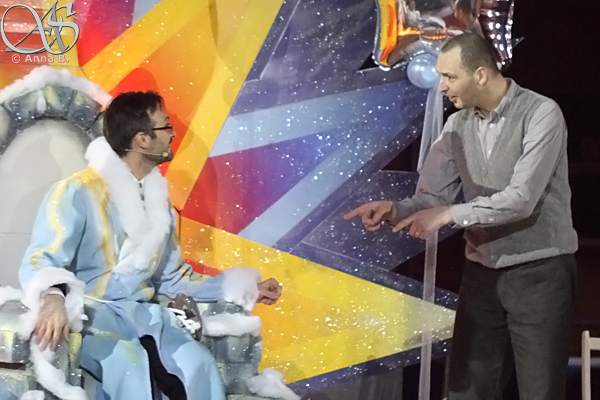
So you enjoy your work, this is important.
Yes, yes! You know, I have several jobs, but "Music on Ice" takes around 98% of my time. I feel really lucky because I had a great career in the [amateur] sport, then I had a great professional career and now I enjoy preparing shows myself. I feel very lucky.
Inferno, Paradise... What's next?
We have a few ideas for the next three or four years. We do not lack ideas!
We must grow every year to reach our next goal. We have obviously more and more ambitious plans, but we know that we need time to achieve our goals. The choice is just based on our ability to develop the idea 100%. So... step by step.
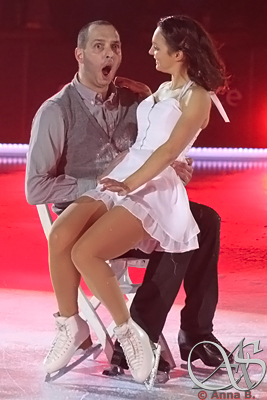 We heard that there are plans to bring the show to other countries.
We heard that there are plans to bring the show to other countries.
Yes, we already have quite a long list of people who want to host our show outside Switzerland. We need to investigate everything; we don't agree with doing it half-way. We want to do things well or not to do them at all. Last year, we had the show in Geneva and it was a great success, there's no doubt we'll go back. There are other cities, but I can't tell you which exactly now because we are still discussing. Things are "under construction." I really believe in quality, so I will go if I can offer quality, I will not go just to do another show; I'm not interested in that.
In the show "Music on Ice: Japan" two years ago, you had small stories between the skaters' programs; each number was connected with the previous one. Here it was less so.
"Japan" was a complicated [show] for me. We were doing it after the tsunami [catastrophe], and it was really sad and strong, there were a lot of feelings involved. We were working with the Red Cross. We really wanted to bring hope so we pushed really hard to make those connections in the show. For example, moments of humanity between the skaters and also a lot of funny moments to lighten the atmosphere a little. This time I wanted people to feel as if they were in heaven, to feel serenity, to relax...
It was pure... The opening, the finale too. They were simple and "clean."
Exactly! Each show we try to bring something... You know, when I was competing, I always had stories in my mind when I was skating. I was not skating for four and a half minutes to whatever kind of music; I was telling a story during my performance. It should always be connected to feelings, emotions, to what you feel in this particular moment. Now the challenge is to do the same not in four and a half minutes, but in two hours. The goal stays the same: I want people to almost cry and later I want them to laugh. I always work on what the crowd feels and this is my main motto: I follow the emotions of the audience.
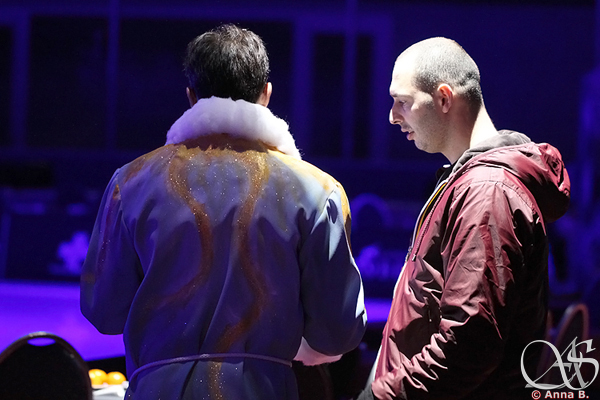
It's very complicated to explain, but actually around May, I already knew how things would be going. It was in my head. This is perhaps the most difficult part for my team - everything is in my head and I have to explain to them what I want. In here (points to his head),  it's very clear! For example, I do all the music cuts because I know exactly to where I want to bring the audience. It won't help to ask somebody else, because I know what I want to do and how I want to achieve it.
So yesterday, after the first show, was the reaction of the public as you expected?
Yesterday I was... you know... actually this is really funny because I spent my whole life making people laugh, and yesterday there were people coming to me and saying: "Oh my God, at the beginning of the show I cried." That's it! After twenty years of skating and making people laugh, finally I made them cry! (laughs)
